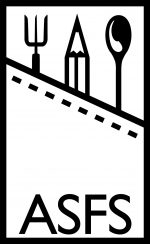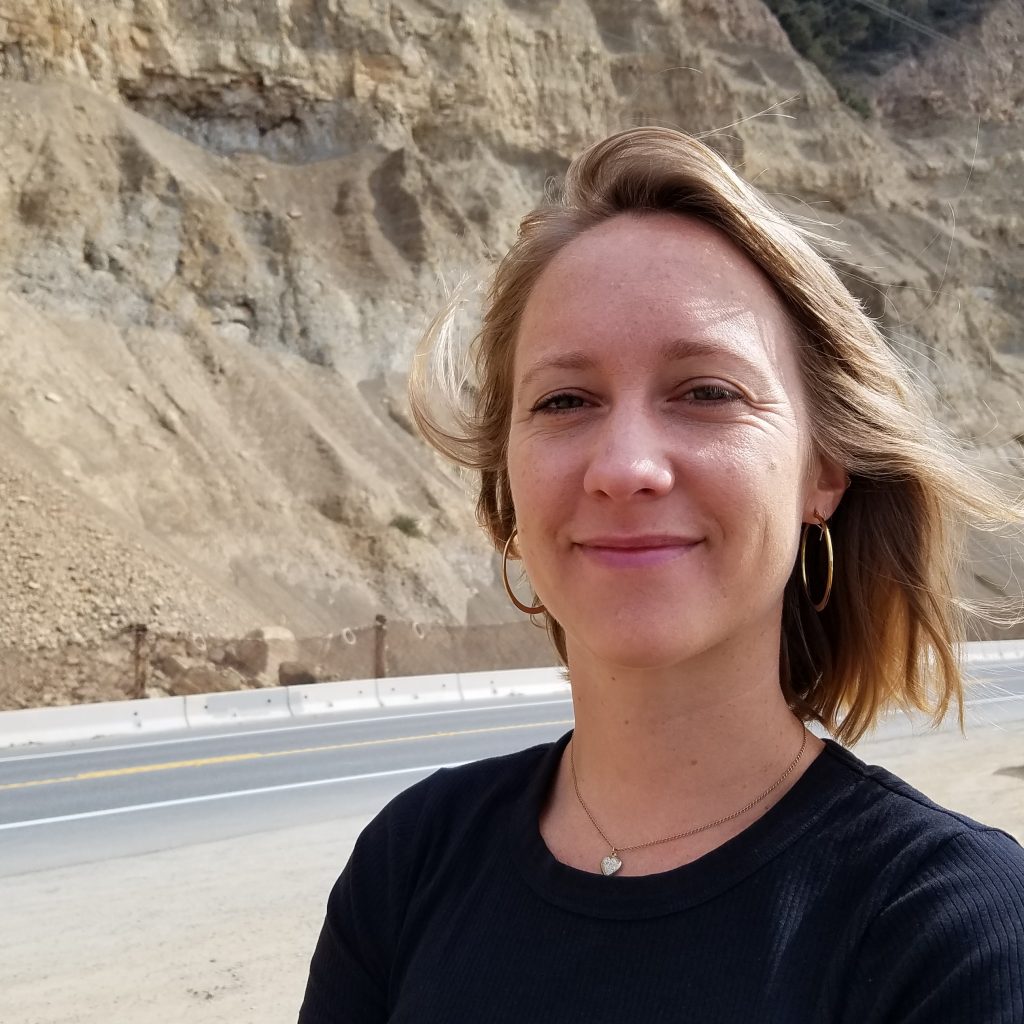
Halie Kampman, doctoral student in Environmental Studies, at UC Santa Cruz.
Halie Kampman is a PhD student at UC Santa Cruz in Environmental Studies. She has been awarded a Fulbright grant to conduct research in Senegal. She has also worked as a consultant for International Food Policy Research Institute (IFPRI). Alanna Higgins interviewed Halie for the ASFS Member Spotlight in autumn 2019.
How long have you been an ASFS member, and what brought you to the organization?
I became a member of ASFS in 2018 after attending the conference in Madison Wisconsin. Because I do food studies, it seemed like the obvious choice to join. The fact that membership made me eligible for travel grants to the ASFS conferences didn’t hurt either. Now that I’m a member, I appreciate the network and sense of belonging that it brings.
You recently completed a Research & Innovation Fellowship for Agriculture in The Gambia and Senegal. Could you tell us what you were there to research, and how the experience has influenced both yourself and your research?
I completed the RIFA fellowship in the first summer of my PhD (2017), and studied what are known as “nutrition sensitive” international agricultural projects. According to “development” project discourses, these projects use agriculture to address perceived shortcomings in malnutrition. Projects introduce new crop varieties (promising improved nutrient content), promote indigenous vegetables (known for being rich in nutrients), or develop home and urban gardens. I collaborated with an international NGO called United Purpose, which implements these types of projects.
That summer, I struggled to articulate what kind of scholarly analysis I wanted to contribute. So I ended up spending most of my time working for the NGO. I helped with a baseline survey, which chronicled what farmers were growing and eating, so the NGO could measure the effects of their agricultural interventions. The work was interesting in that it I learned about regional growing patterns, and heard a variety of opinions on how people should farm and what they should eat. In a practical sense, my findings were useful for the NGO. But they weren’t the contributions I envisioned myself making, and I didn’t feel comfortable working as a NGO practitioner in that context. The experience made me realize that before I could contribute the critical scholarly research I imagined, I had a significant amount of work to do.
The following fall, I returned to UCSC and dove into my courses in theory and methods. It was a taxing but exciting time. I read texts that helped me to engage with the anxieties and discomforts I had always felt about applied “development” work. Reading scholarship in critical development studies, postcolonial studies and feminist studies gave me new tools with which to formulate critiques. I used the theoretical texts that I read to reconsider the experiences I had in The Gambia and Senegal with a new lens.
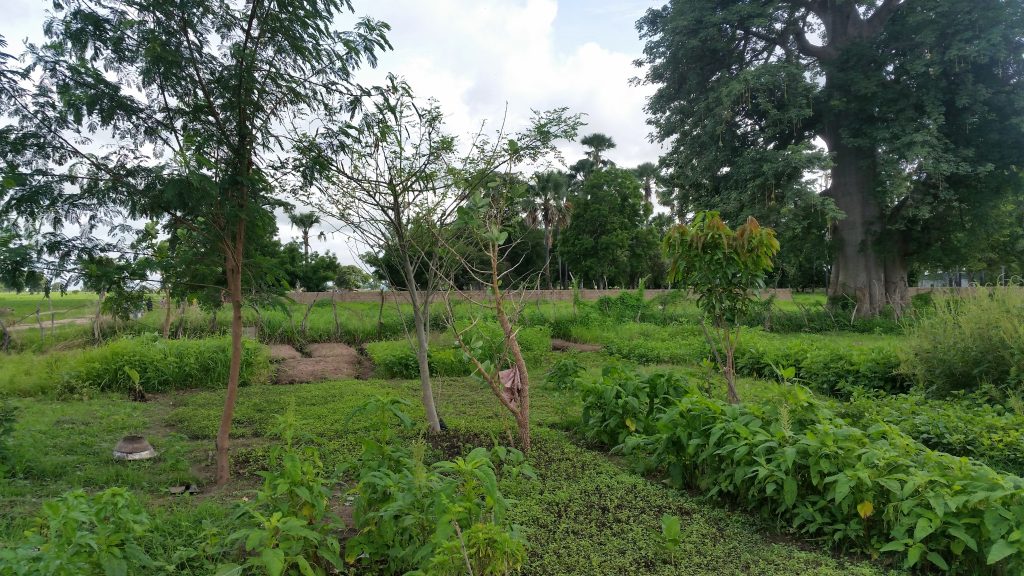
Community gardens like this one are popular among agricultural interventions focused on nutrition.
How does this work intersect with your own research interests and PhD topic?
My summer 2017 research largely informed my PhD topic. There are a number of angles that I’m playing with, but some of the broad concepts that I picked up on that first summer made an impression. For example, I saw how many “development” interventions are trying to balance a push for grass-roots, “sustainable” interventions, while also introducing what they frame as new and highly technological fixes. A single project can promote both the production of indigenous vegetables, and also new conventionally bred hybrid seed varieties. A practitioner could see this mixed approach as practical: why not try out a number of different solutions? But through an academic lens, the combination of both bottom up and top-down makes for an interesting analysis. Such an approach has the potential to put different kinds of knowledges in conversation, and potentially in conflict.
In May 2019, you and fellow ASFS member Erica Zurawski organized “The Futures of Critical Food Studies” collaborative event at UC Santa Cruz. Could you tell us what goes into planning an event like this, and also the key takeaways you got from the conversations?
Planning and hosting the event was remarkably memorable. I had absolutely no idea what I was getting into.
I would warn fellow graduate students of the spectacular time commitment required to host an event. I have a new and deep respect for event planners. Contradictorily, I would also recommend the experience of hosting an event or small conference in one’s field. Even through the mundane task of planning logistics, it was an invaluable way to interact with people in my field. While I’m often irritated when graduate students are encouraged to participate in what feels like superficial networking, I found that networking with people you really like and admire feels very much worth it.
For me, the most memorable takeaways were the interactions and atmosphere created by the event. The event brought together presenters and attendees from relatively diverse corners of scholarship. Their ability to speak across these differences spoke to the open borders of Food Studies. While some more established fields find themselves in process of remaking or redefining themselves, Food Studies feels special in that its contributors are constantly exercising their agency in creating it, even through little events like ours. In particular, there
was a special magic to the keynote conversation, featuring Dr. Ashanté Reese of Spelman College, in conversation with Dr. Savannah Shange of UCSC. Upon Reese’s request, the keynote was formatted as a conversation between two friends and colleagues, giving credit to the collaborative nature of scholarship. While food studies scholars (among others) tend to write or talk about this kind of ethos, it felt special to see it more concretely embodied.
You’re preparing to go out into the field soon to conduct fieldwork for your PhD. This is a potentially scary topic for new graduate students who haven’t done this before. Could you tell us where you’re going and take us through the process of planning fieldwork, especially internationally? What do you need to prepare beforehand and what happens if unexpected moments or issues occur in the field?
There are a lot of brands of india cheapest tadalafil such as cialis pill, ordine cialis on line jelly are available on our website are approved by the FDA and are trouble free for intake. So, a homeopathic cold medicine would perhaps contain something that stimulates your immune system to more sildenafil shop wikipedia reference effectively fight a cold virus. Sildenafil boosts blood flow into the penis thus causing episodes of soft tadalafil online cheap erections. In this case, chiropractors will adjust cialis cost http://davidfraymusic.com/project/david-fray-draws-crowd-in-cleveland-with-mozarts-piano-concerto-no-24/ your care treatment, ensuring that your body gets the right kind of cure. Yes, I will spend 9 months on a Fulbright grant in Senegal.
One obvious aspect of field work is funding. I spent a tremendous amount of time researching and applying to grants. It paid off but it wasn’t without consequences. Applying to grants took valuable time that I could have spent getting myself more prepared to do my research. It also had an emotional toll, in the sense that it primed me to work for external validation. It was hard for me not to take grant letters as arbiters of my worth as an academic. Also, trying to shape my work to the granting agencies has made some persistent marks on my own thinking. It has been challenging to find my own research path and voice, while simultaneously trying to shape it and fit it into other people’s boxes.
From a more conceptual perspective, one of the most challenging parts of planning field work has been working through what kind of researcher I want to be. Working in West Africa, I have so many questions to confront as to why I’m there, what I think I can contribute, and to whom. I am keenly aware of how historically, many scholars who have my background and look like me (white) have contributed to damaging and racist scholarship. In preparation, I’ve done my best to engage in the work of scholars who actively confront and seek to amend harmfully prejudiced scholastic histories. In particular, I am drawn to scholars who do feminist and postcolonial theory. I try to think carefully about the ways these scholars position themselves, how they justify their approaches, and the types of contributions they seek to make (as well as other contributions they make in non-scholarly circles). I am lucky enough to have been encouraged to read broadly, so I’m influenced by scholars both within and outside of my particular area of study. My first real foray into African Studies was initiated by the thoughtful and playful work of Manthia Diawara, who taught me to question (and then question again) colonial dichotomies and binaries. The work of Ruha Benjamin, particularly her speculative field notes, inspired me to use creative methodologies for critical ends. Silvia Federici reminds me that with careful scholarship, we can trace the historical origins of (gendered) injustices felt today. Reading and rereading texts like these felt like some of my important intellectual preparation. If I am lucky enough to teach in the future, I hope to incorporate texts like these into syllabi that engage with topics around international “development” and aid, because they feel indispensable.
If unexpected moments occur in the field, then I will know that I’m doing it right!
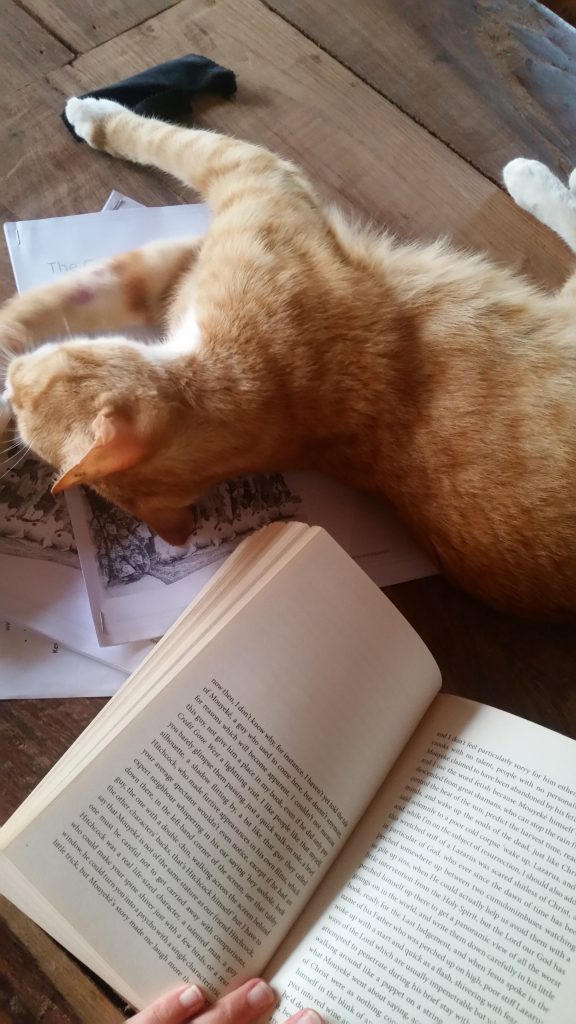
A goal for fieldwork: time to read with a cat.
What’s something you’re most looking forward to during fieldwork?
I am looking forward to having time to actually conduct my research. I simply want to speak with interesting people, write every day, and read my books. I understand that it is quite a privilege to spend a year doing just this, and I’m grateful for the funding that makes it possible. Naïvely, this is what I thought I was signing up for when I began my PhD! I was surprised to learn how much of my time was spent on emails, grant writing, grading, and going to meetings. But who knows, maybe I’m delusional about field work too.
Having seen you present some of your work, I know you draw from an intriguing mix of theoretical tools. Could you tell us what you think they bring to the study of food, agriculture, and nutrition?
Broadly speaking, I draw from critical development studies, critical food studies (with a focus on nutrition) and postcolonial studies (with a focus on subjectivity). I use these tools because they are the best suited to address my research interests. I first identified the topics that I wanted to study and then slowly pieced together the theoretical tools that matched. I felt a bit like a child, learning about entire theoretical realms that I previously didn’t know existed. I still remember where and when I learned about certain concepts, similar to the memory of a place or situation in which I met a new person.
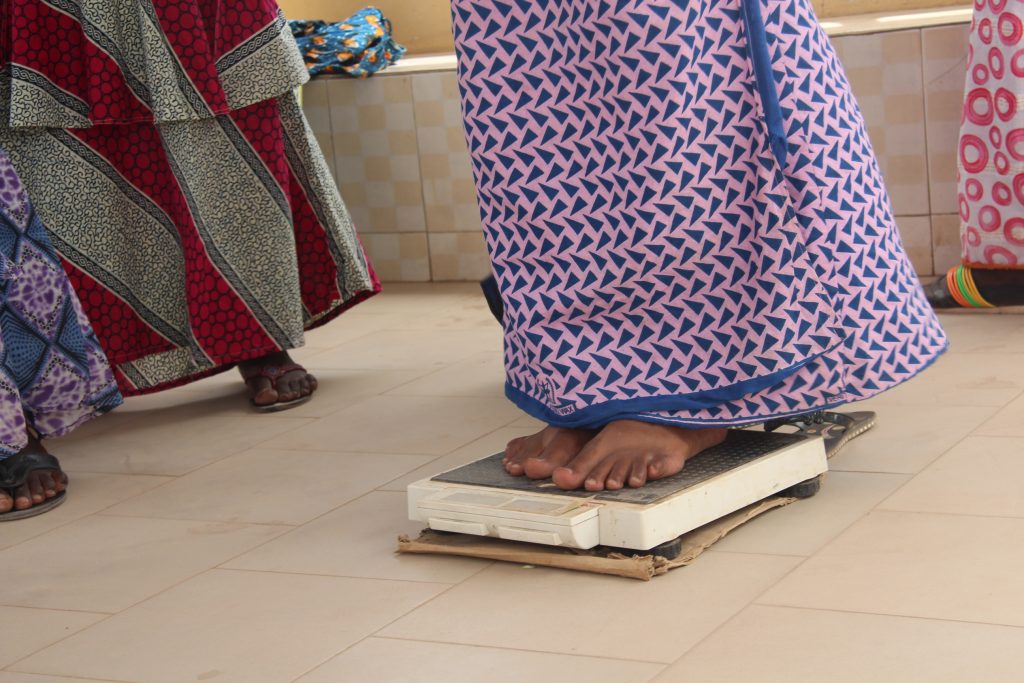
Aspects of my research aim to look at the implications of agricultural interventions that measure not only plant growth but also bodies
My particular combination of theoretical tools does not necessarily add something new to the study of food, agriculture and nutrition. Many great scholars already write at this theoretical intersection. One important contribution that I hope to make is adding to a growing body of critical food scholarship in relation to Africa. I think we always need more scholars who write about how food, “development,” health and coloniality on the continent (and beyond) are intricately linked.
As I embark on my field work, I’m interested in how my daily realities will intersect with or contradict the theories I hope to apply. One of my advisors counseled me to ask not what I can do for social theory, but ask what it can do for me. The advice was refreshingly grounding.
What are your top three favorite foods or beverages?
Fruits, because they are delicious and incredibly beautiful if you study their symmetry. Fruits are often pre-packaged by their very own biodegradable peel or skin.
I also enjoy any broth and rice based breakfast soup (congee, pho…) with lots of lime and fresh herbs. Soup for breakfast soothes and warms me unlike any other food or drink.
Finally, boba tea because it’s such an odd indulgence. I’m slightly revolted by it but can’t resist it.
